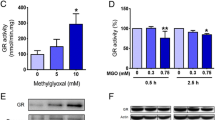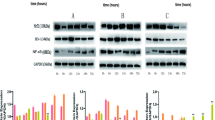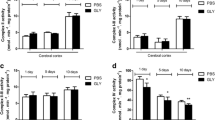Abstract
Carbonyl compounds such as methylglyoxal (MGO) seem to play an important role in complications resulting from diabetes mellitus, in aging and neurodegenerative disorders. In this study, we are showing, that MGO is able to suppress cell viability and induce apoptosis in the cerebral cortex and hippocampus of neonatal rats ex-vivo. These effects are partially related with ROS production, evaluated by DCFH-DA assay. Coincubation of MGO and reduced glutathione (GSH) or Trolox (vitamin E) totally prevented ROS production but only partially prevented the MGO-induced decreased cell viability in the two brain structures, as evaluated by the MTT assay. Otherwise, L-NAME, a nitric oxide (NO) inhibitor, partially prevented ROS production in the two structures but partially prevented cytotoxicity in the hippocampus. Pharmacological inhibition of Erk, has totally attenuated MGO-induced ROS production and cytotoxicity, suggesting that MEK/Erk pathway could be upstream of ROS generation and cell survival. Otherwise, p38MAPK and JNK failed to prevent ROS generation but induced decreased cell survival consistent with ROS-independent mechanisms. We can propose that Erk, p38MAPK and JNK are involved in the cytotoxicity induced by MGO through different signaling pathways. While Erk could be an upstream effector of ROS generation, p38MAPK and JNK seem to be associated with ROS-independent cytotoxicity in neonatal rat brain. The cytotoxic damage progressed to apoptotic cell death at MGO concentration higher than those described for adult brain, suggesting that the neonatal brain is resistant to MGO-induced cell death. The consequences of MGO-induced brain damage early in life, remains to be clarified. However, it is feasible that high MGO levels during cortical and hippocampal development could be, at least in part, responsible for the impairment of cognitive functions in adulthood.





Similar content being viewed by others
References
Ahmed N, Battah S, Karachalias N, Babaei-Jadidi R, Horányi M, Baróti K, Hollan S, Thornalley PJ (2003) Increased formation of methylglyoxal and protein glycation, oxidation and nitrosation in triosephosphate isomerase deficiency. Biochim Biophys Acta 1639:121–132
Alberts B, Johnson A, Lewis J, Raff M, Roberts K, Walter P (2008) Mechanisms of cell communication. In: Anderson M, Granum S (eds) Molecular biology of the cell, 5th edn. Garland Science, New York, pp 879–964
Beeri MS, Moshier E, Schmeidler J, Godbold J, Uribarri J, Reddy S, Sano M, Grossman HT, Cai W, Vlassara H, Silverman JM (2011) Serum concentration of an inflammatory glycotoxin, methylglyoxal, is associated with increased cognitive decline in elderly individuals. Mech Ageing Dev 132:583–587
Chan WH, Wu HJ, Shiao NH (2007) Apoptotic signaling in methylglyoxal-treated human osteoblasts involves oxidative stress, c-Jun N-terminal kinase, caspase-3, and p21-activated kinase 2. J Cell Biochem 100:1056–1069
Chen YJ, Huang XB, Li ZX, Yin LL, Chen WQ, Li L (2010) Tenuigenin protects cultured hippocampal neurons against methylglyoxal-induced neurotoxicity. Eur J Pharmacol 645:1–8
Circu ML, Aw TY (2010) Reactive oxygen species, cellular redox systems, and apoptosis. Free Radic Biol Med 48:749–762
Cuenda A, Rousseau S (2007) p38MAP-kinases pathway regulation, function and role in human diseases. Biochim Biophys Acta 1773:1358–1375
de Arriba SG, Stuchbury G, Yarin J, Burnell J, Loske C, Münch G (2007) Methylglyoxal impairs glucose metabolism and leads to energy depletion in neuronal cells—protection by carbonyl scavengers. Neurobiol Aging 28:1044–1050
Di Loreto S, Caracciolo V, Colafarina S, Sebastiani P, Gasbarri A, Amicarelli F (2004) Methylglyoxal induces oxidative stress-dependent cell injury and up-regulation of interleukin-1 beta and nerve growth factor in cultured hippocampal neuronal cells. Brain Res 1006:157–167
Di Loreto S, Zimmitti V, Sebastiani P, Cervelli C, Falone S, Amicarelli F (2008) Methylglyoxal causes strong weakening of detoxifying capacity and apoptotic cell death in rat hippocampal neurons. Int J Biochem Cell Biol 40:245–257
Driver AS, Kodavanti PR, Mundy WR (2000) Age-related changes in reactive oxygen species production in rat brain homogenates. Neurotoxicol Teratol 22:175–181
Falone S, D’Alessandro A, Mirabilio A, Petruccelli G, Cacchio M, Di Ilio C, Di Loreto S, Amicarelli F (2012) Long term running biphasically improves methylglyoxal-related metabolism, redox homeostasis and neurotrophic support within adult mouse brain cortex. PLoS One 7:e31401
Fan X, Subramaniam R, Weiss MF, Monnier VM (2003) Methylglyoxal-bovine serum albumin stimulates tumor necrosis factor alpha secretion in RAW 264,7 cells through activation of mitogen-activating protein kinase, nuclear factor kappaB and intracellular reactive oxygen species formation. Arch Biochem Biophys 409:274–286
Fukunaga M, Miyata S, Liu BF, Miyazaki H, Hirota Y, Higo S, Hamada Y, Ueyama S, Kasuga M (2004) Methylglyoxal induces apoptosis through activation of p38 MAPK in rat Schwann cells. Biochem Biophys Res Commun 320:689–695
Goldin A, Beckman JA, Schmidt AM, Creager MA (2006) Advanced glycation end products: sparking the development of diabetic vascular injury. Circulation 114:597–605
Haut SR, Velisková J, Moshé SJ (2004) Susceptibility of immature and adult brains to seizure effects. Lancet Neurol 3:608–617
Huang SM, Hsu CL, Chuang HC, Shih PH, Wu CH, Yen GC (2008) Inhibitory effect of vanillic acid on methylglyoxal-mediated glycation in apoptotic Neuro-2A cells. Neurotoxicology 29:1016–1022
Kalapos MP (2008) The tandem of free radicals and methylglyoxal. Chem Biol Interact 171:251–271
Kim J, Kim OS, Kim CS, Kim NH, Kim JS (2010) Cytotoxic role of methylglyoxal in rat retinal pericytes: involvement of a nuclear factor-kappaB and inducible nitric oxide synthase pathway. Chem Biol Interact 188:86–93
Kim H-A, Kim K-J, Seo KH, Lee H-K, Im S-Y (2012) PTEN/MAPK pathways play a key role in platelet-activating factor-induced experimental pulmonary tumor metastasis. FEBS Lett 586:4296–4302
Kimura R, Okouchi M, Fujioka H, Ichiyanagi A, Ryuge F, Mizuno T, Imaeda K, Okayama N, Kamiya Y, Asai K, Joh T (2009) Glucagon-like peptide-1 (GLP-1) protects against methylglyoxal-induced PC12 cell apoptosis through the PI3K/Akt/mTOR/GCLc/redox signaling pathway. Neuroscience 162:1212–1219
Knockaert L, Berson A, Ribault C, Prost PE, Fautrel A, Pajaud J, Lepage S, Lucas-Clerc C, Bégué JM, Fromenty B, Robin MA (2012) Carbon tetrachloride-mediated lipid peroxidation induces early mitochondrial alterations in mouse liver. Lab Investig 92:396–410
Kuhla B, Luth HJ, Haferburg D, Boeck K, Arendt T, Munch G (2005) Methylglyoxal, glyoxal, and their detoxification in Alzheimer’s disease. Ann N Y Acad Sci 1043:211–216
Laemmli UK (1970) Cleavage of structural proteins during the assembly of the head of bacteriophage T4. Nature 277:680–685
Lee HK, Seo IA, Suh GJ, Lee HJ, Park HT (2009) A novel mechanism of methyglyoxal cytotoxicity in neuroglial cells. J Neurochem 108:273–284
Liu Y, Peterson DA, Kimura H, Schubert D (1997) Mechanism of cellular 3-(4, 5-dimethylthiazol-2-yl)-2, 5-diphenyltetrazolium bromide (MTT) reduction. J Neurochem 69:581–593
Lowry OH, Rosebrough NJ, Farr AL, Randall RJ (1951) Protein measurement with the Folin phenol reagent. J Biol Chem 193:265–275
Maeta K, Mori K, Takatsume Y, Izawa S, Inoue Y (2005) Diagnosis of cell death induced by methylglyoxal, a metabolite derived from glycolysis, in Saccharomyces cerevisiae. FEMS Microbiol Lett 243:87–92
Martinez A, Portero-Otin M, Pamplona R, Ferrer I (2010) Protein targets of oxidative damage in human neurodegenerative diseases with abnormal protein aggregates. Brain Pathol 20:281–297
Min C, Kang E, Yu SH, Shinn SH, Kim YS (1999) Advanced glycation end products induce apoptosis and procoagulant activity in cultured human umbilical vein endothelial cells. Diabetes Res Clin Pract 46:197–202
Morgan PE, Dean RT, Davies MJ (2002) Inactivation of cellular enzymes by carbonyls and protein-bound glycation/glycoxidation products. Arch Biochem Biophys 403:259–269
Mosmann T (1983) Rapid colorimetric assay for cellular growth and survival: application to proliferation and cytotoxicity assays. J Immunol Methods 65:55–63
Munch G, Thome J, Foley P, Schinzel R, Riederer P (1997) Advanced glycation endproducts in ageing and Alzheimer’s disease. Brain Res Brain Res Rev 23:134–143
Pal A, Bhattacharya I, Bhattacharya K, Mandal C, Ray M (2009) Methylglyoxal induced activation of murine peritoneal macrophages and surface markers of T lymphocytes in sarcoma-180 bearing mice: involvement of MAP kinase, NFkappa beta signal transduction pathway. Mol Immunol 46:2039–2044
Ramasamy R, Vannucci SJ, Yan SS, Herold K, Yan SF, Schmidt AM (2005) Advanced glycation end products and RAGE: a common thread in aging, diabetes, neurodegeneration, and inflammation. Glycobiology 15:16R–28R
Ramasamy R, Yan SF, Schmidt AM (2006) Methylglyoxal comes of AGE. Cell 124:258–260
Schmidt B, de Assis AM, Battu CE, Rieger DK, Hansen F, Sordi F, Longoni A, Hoefel AL, Farina M, Gonçalves CA, Souza DO, Perry ML (2010) Effects of glyoxal or methylglyoxal on the metabolism of amino acids, lactate, glucose and acetate in the cerebral cortex of young and adult rats. Brain Res 1315:19–24
Sena CM, Matafome P, Crisóstomo J, Rodrigues L, Fernandes R, Pereira P, Seiça RM (2012) Methylglyoxal promotes oxidative stress and endothelial dysfunction. Pharmacol Res 65:497–506
Sheng B, Gong K, Niu Y, Liu L, Yan Y, Lu G, Zhang L, Hu M, Zhao N, Zhang X, Tang P, Gong Y (2009) Inhibition of gamma-secretase activity reduces Abeta production, reduces oxidative stress, increases mitochondrial activity and leads to reduced vulnerability to apoptosis: implications for the treatment of Alzheimer’s disease. Radic Biol Med 46:1362–1375
Shuvaev VV, Laffont I, Serot JM, Fujii J, Taniguchi N, Siest G (2001) Increased protein glycation in cerebrospinal fluid of Alzheimer’s disease. Neurobiol Aging 397–402
Srikanth V, Westcott B, Forbes J, Phan TG, Beare R, Venn A, Pearson S, Greenaway T, Parameswaran V, Münch G (2012) Methylglyoxal, cognitive function and cerebral atrophy in older people. J Gerontol A Biol Sci Med Sci. 2012 ahead of print
Sriram K, Pai KS, Boyd MR, Ravindranath V (1997) Evidence for generation of oxidative stress in brain by MPTP: in vitro and in vivo studies in mice. Brain Res 749:44–52
Stadtman ER (1992) Protein oxidation and aging. Science 257:1220–1224
Stringari J, Nunes AK, Franco JL, Bohrer D, Garcia SC, Dafre AL, Milatovic D, Souza DO, Rocha JB, Aschner M, Farina M (2008) Prenatal methylmercury exposure hampers glutathione antioxidant system ontogenesis and causes long-lasting oxidative stress in the mouse brain. Toxicol Appl Pharmacol 227:147–154
Thornalley PJ (2003) Glyoxalase I—structure, function and a critical role in the enzymatic defence against glycation. Biochem Soc Trans 31:1343–1348
Thornalley PJ (2005) Dicarbonyl intermediates in the Maillard reaction. Ann N Y Acad Sci 1043:111–117
Tsuchiya K, Tomita S, Ishizawa K, Abe S, Ikeda Y, Kihira Y, Tamaki T (2010) Dietary nitrite ameliorates renal injury in L-NAME-induced hypertensive rats. Nitric Oxide 22:98–103
Uribarri J, Cai W, Peppa M, Goodman S, Ferrucci L, Striker G, Vlassara H (2007) Circulating glycotoxins and dietary advanced glycation end products: two links to inflammatory response, oxidative stress, and aging. J Gerontol A Biol Sci Med Sci 62:427–433
Vermes I, Haanen C, Steffens-Nakken H, Reutelingsperger C (1995) A novel assay for apoptosis. Flow cytometric detection of phosphatidylserine expression on early apoptotic cells using fluorescein labelled Annexin V. J Immunol Methods 184:39–51
Whitaker AN, McKay DG (1969) Studies of catecholamine shock. I. Disseminated intravascular coagulation. Am J Pathol 56:153–176
Xue M, Rabbani N, Thornalley PJ (2011) Glyoxalase in ageing. Semin Cell Dev Biol 22:293–301
Yamagishi S, Amano S, Inagaki Y, Okamoto T, Koga K, Sasaki N, Yamamoto H, Takeuchi M, Makita Z (2002) Advanced glycation end products-induced apoptosis and overexpression of vascular endothelial growth factor in bovine retinal pericytes. Biochem Biophys Res Commun 290:973–978
Yim HS, Kang SO, Hah YC, Chock PB, Yim MB (1995) Free radicals generated during the glycation reaction of amino acids by methylglyoxal A model study of protein-cross-linked free radicals. J Biol Chem 270:28228–28233
Zhang WF, Xu YY, Xu KP, Wu WH, Tan GS, Li YJ, Hu CP (2012) Inhibitory effect of selaginellin on high glucose-induced apoptosis in differentiated PC12 cells: role of NADPH oxidase and LOX-1. Eur J Pharmacol 694:60–68
Acknowledgments
This work was supported by Conselho Nacional de Desenvolvimento Científico e Tecnológico (CNPq), Fundação de Amparo à Pesquisa do Estado do Rio Grande do Sul (FAPERGS) and Propesq-UFRGS.
Author information
Authors and Affiliations
Corresponding author
Rights and permissions
About this article
Cite this article
Heimfarth, L., Loureiro, S.O., Pierozan, P. et al. Methylglyoxal-induced cytotoxicity in neonatal rat brain: a role for oxidative stress and MAP kinases. Metab Brain Dis 28, 429–438 (2013). https://doi.org/10.1007/s11011-013-9379-1
Received:
Accepted:
Published:
Issue Date:
DOI: https://doi.org/10.1007/s11011-013-9379-1




